APWU
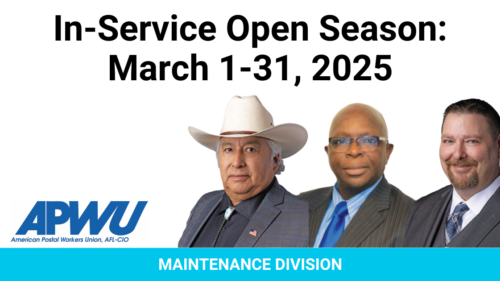
Maintenance Craft In-Service Open Season March 1-31, 2025
March 1, 2025Once a year, during the month of March (March 1-31), ALL career employees may request to be tested for Maintenance Craft eligibility ratings and placement on In-Service Registers.
magazineMaintenance DivisionIdowu Balogun
From March 1-31, ALL career employees may request to be tested for Maintenance Craft eligibility ratings and placement on In-Service Registers. In March, career employees already on the In-Service Register can submit a written request to remain on those registers and avoid the annual purge that occurs on April 1.
Below are the January 18, 2023 Questions & Answers for the Memorandum of Understanding (MOU) Re: In-Service Examinations, Register and Eligibility:
National Q&As on the Memorandum of Understanding (MOU) Re: In-Service Examinations, Register and Eligibility Ratings
Is the March annual service wide opportunity to test for Maintenance Craft eligibility ratings limited to once per year during the month of March?
Yes.
Who is eligible to participate in the annual opportunity to test for Maintenance Craft eligibility ratings?
All career employees are eligible.
Can Maintenance Craft employees participate in the annual opportunity to test for Maintenance Craft eligibility ratings?
Yes.
If In-Service Registers do not exist, where are the exam results placed?
The HR MSS Coordinator is responsible for placing the results in the employee’s eOPF.
What form must career employees complete when submitting a written request to participate in the March annual In-Service opportunity?
Management shall provide an Employee Maintenance Position Selection (EMPS) form as found in the EL-304 to employees.
What occupational group can career employees request to receive eligibility ratings for?
All Maintenance Craft occupational groups (MSS and non-MSS) that require an examination, except National Service Technician ET-11.
Can non-Maintenance Craft, career employees that have already received eligibility ratings request to be tested again in subsequent years in an attempt to improve their scores?
Yes.
What options are available for non-Maintenance Craft employees who have failed the structured interview, but received an eligibility rating on examination 955?
In subsequent years, the employee may (1) request to retake the examination for the structured interview only or (2) can request the opportunity to retake both the examination 955 and the structured interview. If the employee retakes examination 955, the highest achieved score is used as the eligibility rating.
Can current Maintenance Craft employees that have received In-service eligibility ratings for occupational groups that are not in their facility, request to be tested again in subsequent years in an attempt to improve their scores?
Yes.
What happens if an employee is a “no show” for the proctored exam or structured interview during the In-Service process?
The employee is deemed ineligible and may request to take the exam/structured interview during the following year’s annual opportunity.
Are there any changes to the way employees are ranked on In-Service Registers?
No, there are no changes.
If non-custodial In-Service Registers exist, how will employees be added in subsequent years?
Merged in score order.
If an employee on an In-Service Register declines to accept a position in the Maintenance Craft, is that employee’s name removed from the In-Service Register?
No, the employee will be bypassed for that position.
When will In-Service Registers be purged?
Every year on April 1.
What must employees on In-Service Registers do to avoid the April purge and remain on In-Service Registers?
Employees must submit a written request by March 31 to the District HR MSS Coordinator. The exception is employees on custodial In-Service Registers, which are not purged.
Is there a specific form that employees must use to submit their notification to management of their intent to avoid the April purge and remain on In-Service Registers?
No, any written/emailed request to remain on the In-Service Registers will be accepted. ■
Maintenance Craft In-Service Open Season
March 1-31, 20250
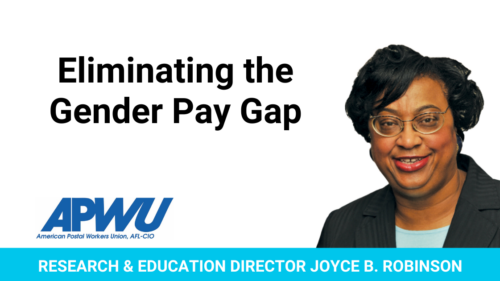
Eliminating the Gender Pay Gap
March 24, 2025Research and Education Director Joyce Robinson provides information to illustrate the pay gap between men’s and women’s wages and legislation aimed to combat it.
magazineResearch and EducationJoyce B. Robinson
Because women earn less than men, they must work longer for the same amount of pay. Equal Pay Day originates from the 1996 National Committee on Pay Equity to illustrate the gap between men’s and women’s wages, and is the symbolic day when women’s earnings catch up to men’s earnings from the previous year. This year, National Equal Pay Day will be celebrated on Tuesday, March 25, 2025.
Gender Gap by Race and Age
Federal women employees are protected by The Equal Pay Act of 1963, which made it illegal for employers to pay unequal wages to men and women who perform equal work. But many states do not follow these laws. According to the Bureau of Labor Statistics, in the second quarter of 2024, the median weekly earnings was $1,253 for men and $1,017 for women. The data also revealed discrepancies by race. The median weekly earnings of white women were $1,037, while Black women’s earnings were $906, or 87.4 percent compared to white women. Latina women earned $831, or 80.1 percent of earnings per dollar by white women. Asian women earned $1,337, which was higher than white women. And by age, the median weekly earnings of women were highest for women ages 45 to 54 at $1,151, and lowest for women ages 16 to 24 at $771.
Institute for Women’s Policy Research Findings
According to the Institute for Women’s Policy Research, more than 36 million households in the U.S. are headed by women. Forty-eight percent of white mothers, 49 percent of Latina mothers, 79 percent of Black mothers, 64 percent of Native American mothers, and 43 percent of Asian and Paci c Islander mothers are breadwinners in their households. Yet, mothers overall are paid just 62 cents for every dollar paid to fathers.
The wage gap also varies by state and congressional district. In Utah, where the gap is the widest, women are paid only 61 cents for every dollar paid to men (a gap of 39 cents for every dollar). Even in Vermont, where the gap is the narrowest, women are paid just 83 cents for every dollar paid to men – a gap of 17 cents. In each of the 435 congressional districts across the country and the District of Columbia, the median annual pay for women is less than the median annual pay for men.
The Paycheck Fairness Act
The Paycheck Fairness Act (PFA) was a bill that addressed wage discrimination in the workplace. The House of Representatives formerly passed the bill in April 2021, during the 117th Congress, and it moved to the Senate in March 2023. However, it did not make it to the floor for a vote. If reintroduced and passed in the new Congress, the PFA would help strengthen the Equal Pay Act and eliminate wage discrimination by:
Limiting an employer’s defense that a pay differential is based on a factor other than sex to only bonafide job-related factors in wage discrimination claims,
Enhancing nonretaliation prohibitions,
Making it unlawful to require an employee to sign a contract or waiver prohibiting the employee from disclosing information about the employee’s wages, and
Increasing civil penalties for violations of equal pay provisions.
Equal Pay Day is on March 25, 2025. Wear RED to show solidarity with the fight for pay equity and gender equality! ■
Resources: Institute for Women’s Policy Research, National Committee on Pay Equity, Bureau of Labor Statistics and the US Census Bureau.
Eliminating the Gender Pay Gap0
Read More....CNN: US Postal Service head DeJoy resigns
March 24, 2025
Louis DeJoy resigned from his role as head of the US Postal Service on Monday, leaving the independent government agency at a time when it faces calls for privatization and scrutiny from the Trump administration.
Louis DeJoy resigned from his role as head of the US Postal Service on Monday, leaving the independent government agency at a time when it faces calls for privatization and scrutiny from the Trump administration.
In a statement released by USPS, DeJoy said while the 250-year old-service had made “beneficial change to what had been an adrift and moribund organization,” more work was necessary “to sustain our positive trajectory.”
CNN: US Postal Service head DeJoy resigns0
Read More....US Postal Service head DeJoy resigns
https://www.cnn.com/2025/03/24/politics/usps-head-dejoy-resigns/index.htmlMonday, March 24, 2025US Postal Service head DeJoy resigns
Read More....President Dimondstein’s Statement on Resignation of Postmaster General Louis DeJoy
March 24, 2025Make no mistake, Louis DeJoy was forced out by a White House Administration that is intent on breaking up and selling off the public Postal Service. The Board should move as quickly as possible to hire as the next permanent postmaster general, someone committed to the public service mission of the USPS, who respects the rights of hardworking postal workers, and who will not break up and sell off our public Postal Service.
Today Louis DeJoy resigned as Postmaster General. By law, Deputy Postmaster General Doug Tulino becomes interim PMG.
Make no mistake, Louis DeJoy was forced out by a White House Administration that is intent on breaking up and selling off the public Postal Service. Reports from last month made clear that the White House has plans for a hostile takeover of the Postal Service.
As I said then, any attack on the Postal Service is part of the ongoing oligarchs’ coup against the vital public services our members and other public servants provide the country. We know that privatized postal services will lead to higher postage prices, and lower service quality to the public.
No matter who leads the USPS, it is – and must remain – the People’s Postal Service.
Our goals as the APWU remain the same – to defend the public postal service, fight for new and expanded services, to defend the rights of postal workers and fight to improve our pay, benefits, and working conditions.
The service our members provide every single day, in every community, are vital to the country. We will continue to lead the fight to ensure that the Postal Service stays in the hands of its rightful owners – the people – and that it continues to provide quality, universal service that the public deserves.
The law is clear: the Postal Service was created by Congress as an independent agency, designed to be free from shifting political winds and dedicated solely to serving the country. The law is also clear that the Board of Governors, and it alone, is empowered to hire and fire the postmaster general. Any attempt by this Administration to seize power from the Board is unlawful and only makes clear their goal of breaking up and selling off the Postal Service to private corporations.
The APWU calls on the Board of Governors to stand its ground and take its responsibilities seriously. The Board should move as quickly as possible to hire as the next permanent postmaster general, someone committed to the public service mission of the USPS, who respects the rights of hardworking postal workers, and who will not break up and sell off our public Postal Service.
APWU President Mark Dimondstein
Ask your Representative to Support the Independent Public Postal Service
Write to your representative in the House and urge them to cosponsor H. Res. 70 to stand with the Postal Service and its dedicated workforce against the threat of privatization.
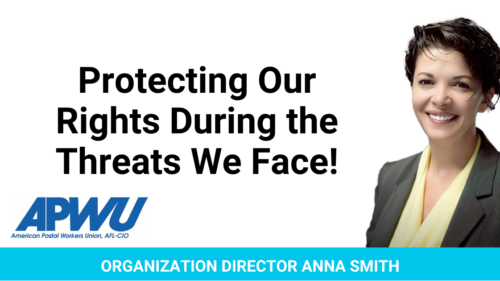
Protecting Our Rights During the Threats We Face!
March 24, 2025The threats to our collective bargaining rights are very real. There are new policies that some people in power want to implement, which could signi cantly impact our ability to negotiate for our wages, rights, and benefits. Organization Director Anna Smith provides ways postal workers can protect our rights.
magazineOrganizationAnna Smith
Almost from the day we start working at the Postal Service, we hear negative comments such as, “the Post Office is going under,” or “automation will replace our jobs.” For those who have been around for any length of time, those predictions have fallen short. Despite the threats, we are still here today!
We learn to adapt to changes and adjust how things are done, and we will continue to do so. One thing is for sure, the workplace as we know it today will not be the same in five years, or even a year from now.
However, the threats to our collective bargaining rights are very real. There are new policies that some people in power want to implement, which could signi cantly impact our ability to negotiate for our wages, rights, and benefits.
What can we do? We push back! We must strengthen our union’s power by increasing our membership, organizing, and taking action. Stay informed and know your rights. There is a wealth of information available at union meetings, in union publications, and by visiting www.apwu.org. Together we must build community support for the work we do as postal workers. We must stand up and take action to protect the rights we have.
No action you take to protect our rights will be too small, such as having a conversation with your nonmember coworkers asking them to stand with you, making a phone call to a legislator, or even just sharing a post on social media about a collective APWU action. Make protecting your job and rights a priority.
What does the Volunteer Early Retirement Incentive mean for the APWU?
The Voluntary Early Retirement (VER) incentive may be beneficial and meet some members’ personal needs, but it will create challenges for our union as a whole and on the workroom floor. One of the positive effects of the VER is that junior employees might have the opportunity to bid into duty assignments that are typically held by senior coworkers. It also gives workers the ability to enjoy their retirement early.
There are some challenging effects that we must adapt to and overcome. Our union membership will decline. Yes, we can build it back up, but any decline in membership means a decline in bargaining power. That isn’t a good position for us to be in during contract negotiations. We all know that management will test us on the workroom floor, demanding more work be done with less people.
As a union, we must protect both those taking the VER and those who remain in the bargaining unit. As the Postal Service replaces those retiring, it is essential that we take every opportunity to bring new employees into the APWU. Have conversations with your non-member coworkers. If you see new employees, ask them to stand with you and join the APWU. If you hear new employees stating they didn’t see a union representative at orientation, let your local union leaders know. Helping nonmembers join is easier than ever with “online join,” it’s quick and can be done from either a mobile device or computer at www.apwu.org. Feel free to reach out to the department for any assistance with organizing.
Remember, for those who are retiring, be sure to take advantage of the rights and benefits of being an APWU Retiree Member. ■
Are You a Newly-Employed Career Employee in Your Craft?
Be sure to request the recently updated Career Employee fliers from your local for the Clerk, Maintenance, and Motor Vehicle Crafts. The newest version has a revision date of 1/2025. Please discard any previous versions, as they have information pertaining to Federal Employees Health Benefi ts (FEHB) rather than the new Postal Service Health Benefi ts (PSHB) program. You can also find them online by visiting: apwu.org/career-employees.
Protecting Our Rights During the Threats We Face!0
Read More....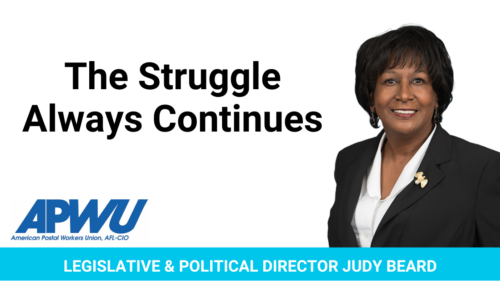
The Struggle Always Continues
March 24, 2025As the dust settles on the start of the 119th
Congress, your Legislative and Political Department
is hard at work fostering relationships with the new and
returning members of Congress.
magazineLegislative and PoliticalJudy Beard
As the dust settles on the start of the 119th Congress, your Legislative and Political Department is hard at work fostering relationships with the new and returning members of Congress. While there are many issues we track, and legislative priorities we advocate for, it is first important to note specific attacks on postal workers.
Potential Attacks on Postal Workers
There are several proposals for federal cost-savings that the APWU is firmly against, some of which were discussed during President Trump’s first term, including:
Raising the Federal Employees Retirement System (FERS) contribution rate;
Reducing or fully eliminating cost-of-living adjustments (COLAs);
Eliminating FERS supplemental retirement payments;
Reducing annuity calculations, basing it on the highest five years of pay (High-5) instead of the highest three (High-3);
Increasing Federal Employees Health Bene ts (FEHB) contributions.
We will continue to carefully watch for potential attacks on the hard-earned benefits of APWU members and retirees during the upcoming congressional budget process.
Recent Executive Actions
Two executive actions taken in January impact our fellow federal workers. First, a hiring freeze was placed on federal civilian employees, with limited exceptions. The executive action goes on to request a formal plan to reduce the size of the federal workforce. Second, President Trump reinstated Executive Order 13957 from Oct. 2020, which created Schedule F – now renamed Schedule Policy/Career. This is a reclassification of federal employees with “policy-influencing positions” as political appointees. In short, Schedule Policy/Career allows the president to appoint his supporters to key government positions, while removing qualified, merit-based hires.
While these two actions do not directly impact postal workers, we must pay close attention to any changes to the federal workforce and be prepared, when called upon, to help our federal union siblings fight back.
The Department of Government Efficiency
The newly established Department of Government Efficiency (DOGE) was created by an executive order signed on Jan. 20, 2025. Recently, lawmakers and news organizations have discussed how to make the Postal Service more “efficient.” Ideas include downsizing the entire Postal Service, embracing Artificial Intelligence (AI) technology with robots replacing employee work, revoking the $3 billion Congress granted to the Postal Service for the new electric vehicle fleet, and replacing the current retirement plan with a defined contribution plan for new hires – drastically reducing retirement bene ts and eliminating the retirement security we have all fought to preserve. Another idea attempts to reduce the total number of career employees and have postal workers cover multiple tasks in various crafts.
Committees to Watch
There are two committees of note with jurisdiction over the Postal Service. In the Senate, the Homeland Security and Governmental Affairs Committee (HSGAC) is tasked with, in part, the responsibility to, “study the efficiency, economy, and effectiveness of all agencies and departments of the federal government.” In the House, the Oversight and Government Reform Committee maintains jurisdiction over the Postal Service and will soon be tasked by Republican House leadership with finding areas of government spending to cut.
Please click here to see if your member of Congress is a member of either crucial committee. We encourage all APWU members to remain vigilant of these and any future attacks on postal workers, especially our hard-earned benefi ts. It is important that we, as postal workers and retirees, defend the work we do to serve the public. Please visit our website at apwu.org/legislative to view information about our current fi ghts and talking points for our legislative priorities.■
The Struggle Always Continues0
Read More....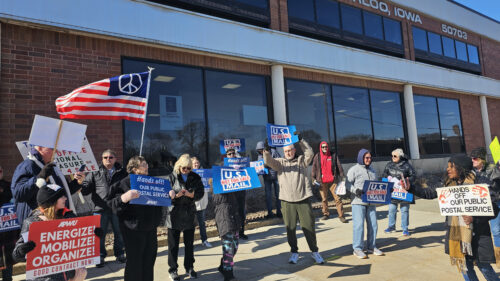
Postal Workers Say, ‘Hands Off’ Our USPS in National Day of Action to Defend the Public Postal Service
March 21, 2025In a resounding show of solidarity, thousands upon thousands of postal workers and members of the community took to the streets for a National Day of Action on March 20 to say, “Hands Off Our Public Postal Service – The U.S. Mail Is Not for Sale!”
US Mail Not for SaleDay of ActionUS Mail Not For Sale – Day of Action
In a resounding show of solidarity, thousands upon thousands of postal workers and members of the community took to the streets for a National Day of Action on March 20 to say, “Hands Off Our Public Postal Service – The U.S. Mail Is Not for Sale!”
From Fairbanks, AK to Honolulu, HI, from San Juan, PR to Bangor, ME, and throughout the country – postal workers and allies took action at over 250 locations to fight for our jobs, our service, and our future.
Spending the day holding informational pickets, handing out leaflets, speaking with customers, holding press conferences and talking with the media, postal workers underscored the importance of a vibrant, public Postal Service.
Postal workers wanted to inform the public and speak about the serious and dangerous threat that postal privatization poses to our jobs and services. If the administration’s plan to sell off the USPS goes through, it will result in higher prices, reduced delivery days, and the end of universal delivery.
Postal privatization wouldn’t just mean the end of reliable, affordable services, it would also destroy more than 600,000 good union jobs. Furthermore, postal workers operate under a universal service obligation, we affordably move the mail to all 169 million addresses every day. Private delivery companies would only go where they could make a profit. That is why we spent the day speaking one on one with customers and reaching out to local media to get the word out that the U.S. Mail Is Not for Sale!
In February, the public Postal Service came under a serious and unprecedented threat by the billionaire “Wall Street” class when the Washington Post reported that the new presidential administration intended to fire the Postal Board of Governors and shift Postal Service operations to the Commerce Department, currently headed by the billionaire Howard Lutnick. They want to aggressively – and illegally – take over and dismantle the public Postal Service in a sell-off to the highest bidders for their own private gains and profits.
“We’re trying to alert the public – the people of the country – that our postal services are truly in danger. This is not a one-off day, this is the beginning of an ongoing fight,” said APWU President Mark Dimondstein, while addressing attendees at the Brentwood Post Office in Washington, DC.
“This is really a fight between Wall Street and Main Street. They want their hands on this money,” he continued, in reference to the nearly $80 billion that the USPS generates in revenue each year, “…and we want to take care of the 169 million addresses that we move the mail to get delivered to every day. We’re not going to let them get the Post Office,” he concluded.
But the fight doesn’t end today! A bipartisan group of lawmakers in the House of Representatives recently introduced House Resolution 70 (H. Res. 70), expressing the sense of the House of Representatives that Congress should take all appropriate measures to ensure that the United States Postal Service remains an independent establishment of the Federal Government and is not subject to privatization.
Visit apwu.org/action to write to your House representative and urge them to cosponsor H. Res. 70 to stand with the Postal Service and its dedicated workforce against the threat of privatization.
Our March 20 National Day of Action was a big success, showing the strength of our solidarity to defend a Postal Service that belongs to the people, and not the billionaires. To see all your photos from across the country, CLICK HERE.
Postal Workers Say, ‘Hands Off’ Our USPS in National Day of Action to Defend the Public Postal Service0
Read More....New York State 2025 Conference
New York State 2025 Conference
May 6 – 7, 2025
Long Island Marriott
101 James Doolittle Boulevard
Uniondale, New York 11553
Hotel Room rate $209/ per night plus taxes and fees
1(800) 228-9280 or (516) 794-3800
Deadline date for room registration April 1
Registration fee $99, deadline April 18
May 6, 2025 – 9:00AM to May 7, 2025 – 5:00PMLong Island Marriott 101 James Doolittle Boulevard
Uniondale, New York 11553
LocalNoYes2025-03-18 00:00:00New York State 2025 Conference10
HRC Flyer
https://d1ocufyfjsc14h.cloudfront.net/sites/default/files/hrc_flyer.pdfHRC Flyer
Read More....